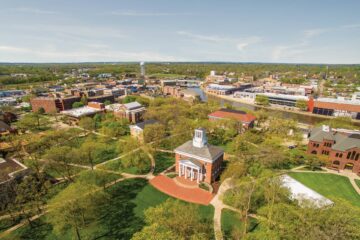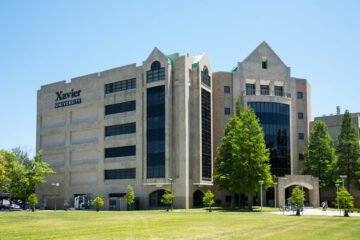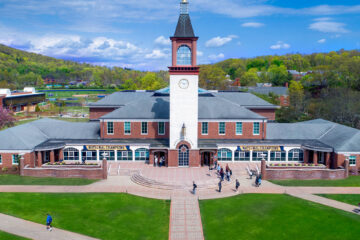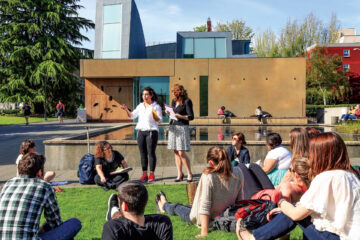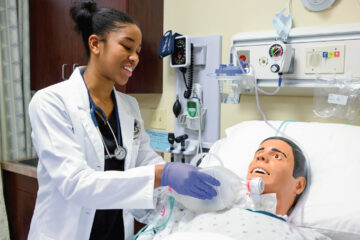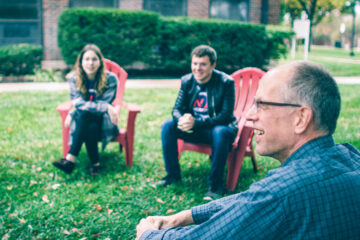The Modern Auditorium: A Pillar of Performing Arts Excellence in Private Higher Education
In higher education, a state-of-the-art auditorium for performing arts programs signifies an institution’s dedication to showcasing talent, creativity, and community involvement. For facility managers and executive leaders, investing in innovative auditorium design and construction is crucial not only for enhancing educational outcomes but also for bolstering institutional prestige and attracting top-tier talent. We took a deeper look into emerging trends in auditorium design, their impact on performing arts programs, and the tangible benefits experienced by institutions that have embraced these advancements.
Making a Career-Oriented Case for the Liberal Arts at Beloit College
Eric Boynton, president of Beloit College, regularly attracts appellations such as “dynamic” and “visionary” because of the innovative campus and community endeavors he has initiated. As provost, he collaborated with Beloit faculty and staff on a number of new projects, such as the articulation of campus-wide integrated learning outcomes and the formation of Impact Beloit, a student career hub which facilitates community partnerships.
Different Mower Options Improve Looks While Increasing Productivity
Rolling hills, grand buildings, lush grass and stately trees are what everyone thinks about when the vision of a college campus comes to mind: students studying in a small group on a blanket laid out on the quad or gathered on a hill to watch a baseball game.
The grass is always green and cut smoothly. Everyone thinks about those images, but few think about the work involved in creating these pristine grounds, aside from the team who work to make the grounds look beautiful and keep them that way. When it comes to taking care of turf that is hard to mow or an area that really needs a makeover, there are a couple of interesting pieces of equipment that address those needs.
The Power of Story at Xavier University of Louisiana
Monica Pierre, Assistant Professor of Practice in the Department of Mass Communication at Xavier University of Louisiana, has already filled many roles in her own life’s story, including those of author, speaker, executive producer, Emmy award-winning journalist, and broadcaster. She continues to garner recognition and honors: the documentary Battlegrounds: The Lost Community of Fazendeville was recently nominated for a Suncoast Regional Emmy; she was executive producer for the project. She attended the Television Academy Foundation’s 2023 Media Educator Conference last month as a recipient of the Alex Trebek Legacy Fellowship. In the classroom and beyond, the driving force behind all of Pierre’s work is her recognition of the immense power held within the stories that people shape and share about their lives.
Advances in Training Counselors at Goldey-Beacom College
Erin-Lee Kelly, PhD, Assistant Professor of Psychology at Goldey-Beacom College, is an innovative educator who brings strengths she has honed in her clinical practice, along with insights from her doctoral program and research, to help re-imagine the Master of Arts in Counseling Psychology program at Goldey-Beacom. Kelly specializes in working with issues relating to sexuality in clinical settings. Since sexuality relates to an immense swath of human experiences—among them, identity, health, healthcare, relationships, and culture—Kelly emphasizes the need for preparing clinicians to discuss and work with clients who are grappling with challenges in any of these areas.
Healthcare Analytics and Artificial Intelligence at Quinnipiac University
Rachida Parks, Associate Professor of Business Analytics and Information Systems in Quinnipiac University’s School of Business and Associate Professor of Medical Sciences at the Medical School, strives to investigate and understand the best uses of artificial intelligence and data analytics in healthcare to promote better outcomes for organizations, practitioners, patients, and her students. Parks has published articles in many leading scientific journals addressing key aspects of AI and analytics. In her Fulbright research, she has focused on these issues in developing countries, and her experiences over the past year have deepened her commitment to supporting emerging scholars, particularly those from groups that are currently underrepresented in higher education.
Data-Driven and Community-Oriented Responses to Crime at Seattle University
Jacqueline B. Helfgott, PhD—Professor of Criminal Justice, Criminology, and Forensics, as well as Director of the Crime and Justice Research Center at Seattle University—is an indefatigable researcher, professor, and community partner. She excels in every arena, with a remarkable publishing record and admirable student mentorship agenda, and her multiple initiatives collaborating with the Seattle Police Department are setting nationwide standards for the field of criminal justice
A Passion for Nursing Simulations at Harding University
Lisa Engel, Associate Professor of Nursing and Director of Simulation at Harding University, skillfully fulfills a great many responsibilities in her various roles: she teaches demanding nursing courses in several degree programs and has been instrumental in establishing and continuing to develop the school’s simulation program. Her zeal for high fidelity nursing simulators impels her to continue finding and exploring the most current innovations available, and she is always delighted to see the students hone their clinical expertise and judgment as they interact with the simulations in the program she oversees.
Leveraging Coursera Career Academy at Hawai'i Pacific University
Mark Rosenbaum, Dean of the College of Business and Professor of Marketing at Hawai’i Pacific University, has drawn on his deep understanding of HPU’s place and stakeholders to develop an exciting, groundbreaking initiative. After assessing the history, strengths, and needs of HPU’s College of Business, Rosenbaum spearheaded the formation of a partnership between Hawai’i Pacific University and Coursera’s Career Academy—the first partnership of this kind in the world.
Historic Immersion: Games, Trips, and Podcasts at Newman University
Kelly McFall, Professor of History and Director of the Honors Program at Newman University, seeks out and employs multiple ways to connect his students and the public to the concerns of history. He originated a podcast channel to publicize new books in Genocide Studies; he has a long history of taking students on educational trips abroad; and he directs Newman’s Honors program. A great deal of his teaching focus, however, lies in playing games with his students—games in which his students are immersed in the history they study.






